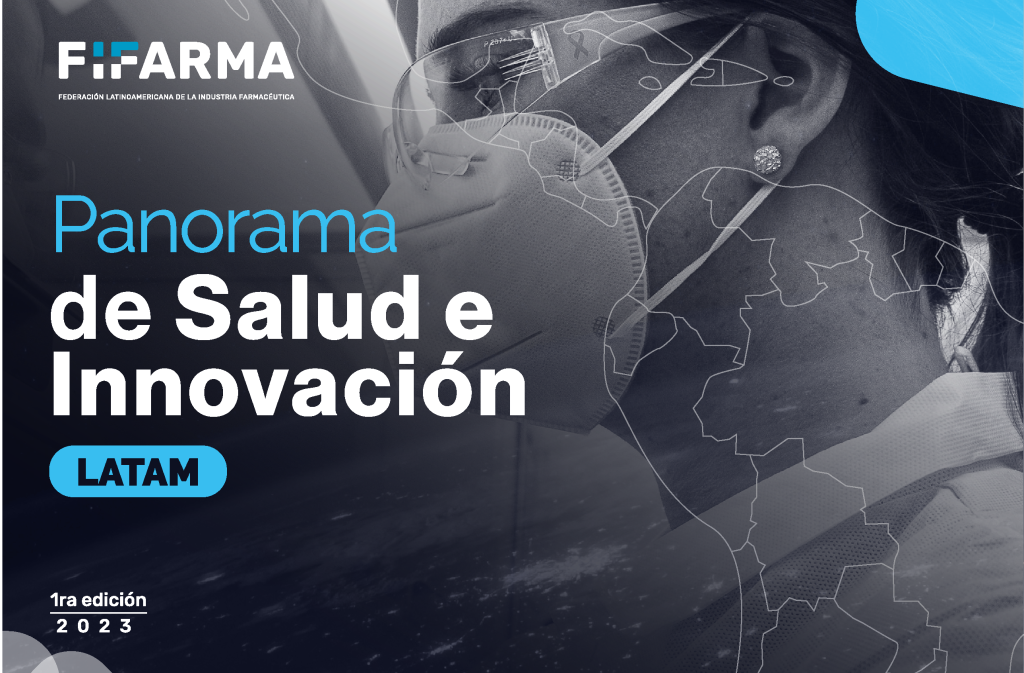FIFARMA Regional Observatory
DATA AT THE SERVICE OF EVERYONE
Conozca el Health Innovation Outlook
El Health Innovation Outlook es uno de los estudios más completos que se ha realizado en América Latina, en el que se analizan e integran 55 indicadores, para comparar el desempeño de 11 países de la región en dos dimensiones: salud e innovación. En este estudio se destacan los avances de Argentina, Brasil, Chile, Colombia, Costa Rica, Ecuador, México, Panamá, Perú, República Dominicana y Uruguay y se identifican los retos y oportunidades para fortalecer sus sistemas de salud.

FIFARMA's Regional Observatory is a new data and analysis space for the sector's ecosystem to have the best information for decision making.
FIFARMA makes available to all interested parties this platform that streamlines access to open data from reliable sources, to provide a complete picture of health in the region in one place.
This is a space in constant evolution, at the service of national authorities, companies, unions, academics, and researchers.
EXPLORE THE DASHBOARDS
Health and Innovation Panorama
These data dashboards provide an agile visualization of the main health indicators in three dimensions: country profiles, health indicators and health innovation. This project is a FIFARMA and Innos collaboration for the promotion of transparency and evidence-based decision making.
ANÁLISIS
Análisis y comentarios sobre las perspectivas y los grandes retos de la salud
Observatorio de Política Regulatoria en Salud para Latinoamérica
OPRES monitors and analyzes health policies and regulations in order to disseminate, explain and contribute to their improvement. A deliberation scenario in partnership with Innos.
Latest publications
Understanding the dynamics of the health sector requires analysis, science and in-depth discussions. Learn about the latest reports published by FIFARMA and our strategic allies.
Indicador W.A.I.T. do Paciente FIFARMA 2025 - (PORT)
O Indicador W.A.I.T. do Paciente FIFARMA 2025, desenvolvido pela IQVIA, analisa o acesso a 403 medicamentos inovadores em 10 países da América Latina, revelando que os pacientes aguardam, em média, mais de cinco anos e meio para ter acesso a tratamentos aprovados pela FDA e pela EMA. Apenas 61% desses medicamentos obtêm aprovação na região, e apenas um terço chega ao setor público. O estudo busca dar visibilidade a essas lacunas e promover soluções para melhorar a equidade e o acesso oportuno a terapias inovadoras.
FIFARMA Patient W.A.I.T. Indicator 2025 (ENG)
The FIFARMA Patient W.A.I.T. Indicator 2025, developed by IQVIA, analyzes access to 403 innovative medicines in 10 Latin American countries, revealing that patients wait an average of over five and a half years to access treatments approved by the FDA and EMA. Only 61% of these medicines receive approval in the region, and just one-third make it to the public sector. The study aims to highlight these gaps and promote solutions to improve equity and timely access to innovative therapies.
FIFARMA Patient W.A.I.T. Indicator 2025 - (ESP)
El FIFARMA Patient W.A.I.T. Indicator 2025, desarrollado por IQVIA, analiza el acceso a 403 medicamentos innovadores en 10 países de América Latina, revelando que los pacientes esperan en promedio más de cinco años y medio para acceder a tratamientos aprobados por la FDA y la EMA. Solo el 61% de estos medicamentos logra aprobación en la región y apenas un tercio llega al sector público. El estudio busca visibilizar estas brechas y promover soluciones para mejorar la equidad y el acceso oportuno a terapias innovadoras.
Adoption of novel clinical evidentiary standards for regulatory decisions-making for approvals in latin america: Fifarma concept paper
Foram apresentados hoje os resultados do primeiro estudo denominado”Valoración de la Industria Farmacéutica Basada en la Investigación en AméricaLatina” (Valorização da Indústria Farmacêutica com Base em Pesquisa na AméricaLatina), realizado pelo IQVIA para avaliar o impacto social e econômico da indústria farmacêutica de inovação na América Latina (Argentina, Brasil, Chile,Colômbia, Costa Rica, Equador, México, Panamá e Peru), encomendado pelaFederação Latino-americana da Indústria Farmacêutica, a FIFARMA.
Investigación Clínica en Latinoamérica: Informe de recomendaciones basadas en mejores prácticas
La investigación clínica es fundamental para avanzar en el desarrollo de nuevas soluciones diagnósticas, pronósticas, preventivas y terapéuticas que respondan a los desafíos actuales en salud. A través de estudios rigurosos, es posible evaluar el efecto de medicamentos potenciales sobre enfermedades específicas y determinar su relación beneficio-riesgo, información clave para que las autoridades reguladoras puedan autorizar su uso. Además, esta investigación permite analizar la seguridad y efectividad de los tratamientos ya aprobados en contextos reales de atención médica, así como explorar su aplicación en nuevas condiciones clínicas.
Relatório de Competitividade e Investimento Biofarmacêutico 2025 (BCI) - PORT
O Relatório de Competitividade e Investimento Biofarmacêutico 2025 (BCI), elaborado pela Pugatch Consilium, analisa o ambiente de investimento em saúde na América Latina. A região obteve uma pontuação média de 59%, ficando atrás de outros mercados emergentes altamente competitivos, como Singapura e Israel. No ranking regional, Costa Rica, Chile e México se destacam como os países com as melhores condições para atrair investimentos biofarmacêuticos.
O estudo identifica avanços importantes nas capacidades científicas e regulatórias em alguns países, mas também ressalta desafios persistentes no acesso ao mercado e na proteção eficaz da propriedade intelectual. Apesar dessas lacunas, o relatório é claro: a América Latina tem uma oportunidade estratégica de se posicionar como um polo de inovação, se adotar políticas públicas mais previsíveis, fortalecer seus marcos regulatórios e promover uma colaboração mais estreita entre os setores público, privado e acadêmico.
Biopharmaceutical Competitiveness & Investment Report 2025 (BCI) - ENG
The 2025 Biopharmaceutical Competitiveness & Investment (BCI) Report, developed by Pugatch Consilium, analyzes the health investment environment in Latin America. The region scores an average of 59%, placing it behind other highly competitive emerging markets such as Singapore and Israel. Within the regional ranking, Costa Rica, Chile, and Mexico stand out as the countries with the most favorable conditions to attract biopharmaceutical investment.
The study highlights significant progress in scientific and regulatory capabilities in some countries but also underscores persistent challenges in market access and the effective protection of intellectual property. Despite these gaps, the report is clear: Latin America has a strategic opportunity to position itself as an innovation hub, if it adopts more predictable public policies, strengthens its regulatory frameworks, and fosters closer collaboration between the public, private, and academic sectors.
El Reporte de Competitividad e Inversión Biofarmacéutica 2025 (BCI) -ESP
El Reporte de Competitividad e Inversión Biofarmacéutica 2025, elaborado por Pugatch Consilium, analiza el entorno de inversión en salud en América Latina. La región obtiene un puntaje promedio de 59%, lo que la ubica por debajo de otros mercados emergentes altamente competitivos como Singapur o Israel. Dentro del ranking regional, Costa Rica, Chile y México se destacan como los países con mejores condiciones para atraer inversión biofarmacéutica.
El estudio identifica avances importantes en capacidades científicas y regulatorias en algunos países, pero también subraya desafíos persistentes en acceso al mercado y protección efectiva de la propiedad intelectual. A pesar de estas brechas, el informe es claro: América Latina tiene una oportunidad estratégica para posicionarse como un hub de innovación, si adopta políticas públicas más predecibles, fortalece sus marcos regulatorios y promueve una colaboración más estrecha entre el sector público, privado y académico.
CONTRIBUCIÓN DE LOS MARCOS NORMATIVOS A LOS PROGRAMAS DE VACUNACIÓN EN AMÉRICA LATINA
Este estudio analiza cómo los marcos normativos impactan la sostenibilidad, cobertura e innovación de los programas de vacunación en América Latina. A partir de las lecciones dejadas por la pandemia de COVID-19, se examinan los retos actuales en la región —como la disminución de coberturas, el avance de discursos antivacunas y la falta de financiamiento sostenido— y se destaca la urgencia de contar con regulaciones sólidas y previsiones presupuestales que garanticen la protección de estos programas. La vacunación, que hoy abarca a todas las etapas de la vida, es una herramienta clave de salud pública con alto retorno en inversión y prevención, por lo que su fortalecimiento es una prioridad estratégica para los sistemas de salud.
Observatório de Boas Práticas Regulatórias (PORT)
Este relatório é uma análise independente sobre a adoção das Boas Práticas Regulatórias (BPR) na regulamentação de produtos farmacêuticos em oito (8) países da América Latina.
A informação provém de fontes confiáveis, no entanto, os dados e informações aqui descritos estarão sujeitos a atualizações e validações. Este estudo não é uma avaliação do nível de maturidade das autoridades regulatórias nacionais de medicamentos, nem substitui ou representa as avaliações oficiais realizadas por organismos autorizados como a Organização Mundial da Saúde (OMS) ou a Organização Pan-Americana da Saúde (OPAS).
Observatory of Good Regulatory Practices (ENG)
This report is an independent analysis of the adoption of Good Regulatory Practices (GRP) in pharmaceutical product regulation in eight (8) Latin American countries.
The information comes from reliable sources; however, the data and information described herein will be subject to updates and validation. This study is not an evaluation of the maturity level of national drug regulatory authorities, nor does it substitute or replace official assessments conducted by authorized bodies such as the World Health Organization (WHO) or the Pan American Health Organization (PAHO).
Observatorio de Buenas Prácticas Regulatorias (ESP)
Este informe es un análisis independiente sobre la adopción de las Buenas Prácticas Regulatorias (BPR) en la regulación de productos farmacéuticos en ocho (8) países de América Latina.
La información proviene de fuentes confiables, sin embargo, los datos e información aquí descrita estarán sujetos a ser actualizados y validados. Este estudio no es una evaluación del nivel de madurez de las autoridades regulatorias nacionales de medicamentos, ni sustituye o reemplaza las evaluaciones oficiales realizadas por organismos autorizados como la Organización Mundial de la Salud (OMS) o la Organización Panamericana de la Salud (OPS).
Análisis de los informes públicos de evaluación (PARs) como herramientas para guiar la toma de decisión basada en la confianza regulatoria por parte de las autoridades regulatorias
La Organización Mundial de la salud recomienda que las Autoridades Regulatorias (ARN) utilicen informes públicos de evaluación (PARs por sus siglas en inglés) como principal fuente de información para llevar a cabo un análisis basado en riesgos; sin embargo, las ARN que utilizan las decisiones de otras jurisdicciones regulatorias de referencia a menudo se enfrentan al desafío de la disponibilidad e integridad de los PARs.
CIRS condujo un estudio para evaluar si la información necesaria para la confianza regulatoria (Reliance) está presente en los PARs de seis ARN de referencia (FDA, EMA, Canadá, Suiza, Australia y Brasil).
FIFARMA Patient W.A.I.T. Indicator 2024 - América Latina (PT)
Melhorar a disponibilidade de medicamentos inovadores na América Latina é uma prioridade para todos os intervenientes no sistema de saúde, especialmente os decisores políticos, os fabricantes de produtos farmacêuticos e os pacientes. Desde 2004, a associação da indústria farmacêutica
A União Europeia (EFPIA) aplica o indicador W.A.I.T. para Pacientes (Waiting to Access Innovative Therapies), que permite às partes interessadas medir a taxa de disponibilidade de medicamentos inovadores em 37 países europeus. Este estudo foi replicado para compreender a taxa de disponibilidade em oito países latino-americanos.
FIFARMA Patient W.A.I.T. Indicator 2024 — América Latina (ESP)
Mejorar la disponibilidad de medicamentos innovadores en América Latina es una prioridad para todos los actores del sistema de salud, especialmente los formuladores de políticas, los fabricantes farmacéuticos y los pacientes. Desde 2004, la asociación de la industria farmacéutica
europea (EFPIA) aplica el indicador W.A.I.T. para Pacientes (por sus siglas en inglés, Waiting to Access Innovative Therapies – En espera de recibir terapias innovadoras), que permite a las partes interesadas medir la tasa de disponibilidad de medicamentos innovadores en 37 países europeos. Este estudio ha sido replicado para comprender la tasa de disponibilidad en ocho países de América Latina.
Explore the databases
Consult the data sources that FIFARMA and its partners make available to researchers, decision makers and authorities in the region.
Contact for researchers
If you have any questions, comments, or requests for information, please contact our team:
Email: info@fifarma.org




